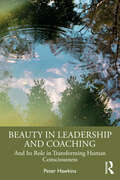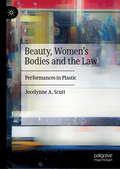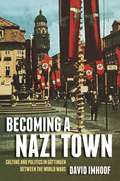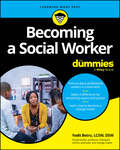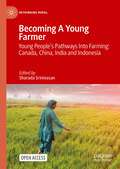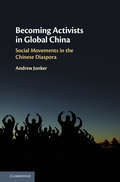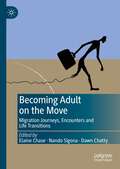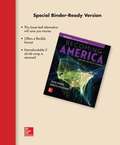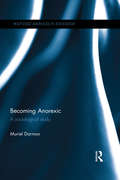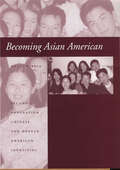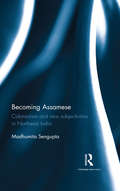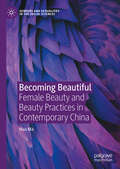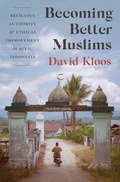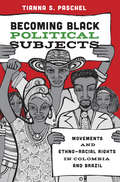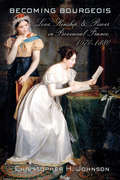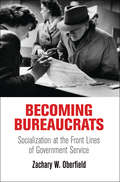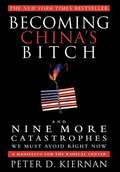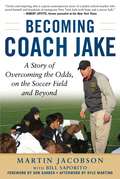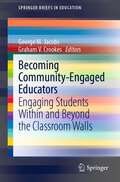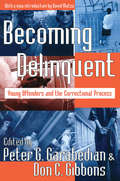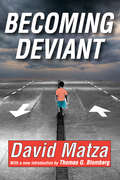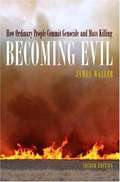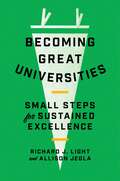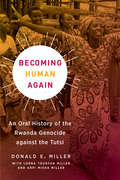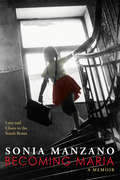- Table View
- List View
Beauty in Leadership and Coaching: And Its Role in Transforming Human Consciousness
by Peter HawkinsWritten by best-selling author and global thought leader Peter Hawkins, Beauty in Leadership and Coaching explores how leaders and coaches can contribute to the urgent task to transform human consciousness to address the great interconnected challenges of our times.Building on a growing interest in ecologically conscious leadership and coaching, as well as the role that poetry, story and beauty can play to transform our work, this book creates a space for both inspiration and reflection, moving beyond seeing the climate crisis and the other major global challenges as a problem to be solved towards an attitude of learning and partnering with the human and the more-than-human world.Globally and transculturally inclusive, this book will appeal to leaders, coaches, organizational development consultants and managers throughout the world, who aspire to grow and develop in their practice and make a greater contribution to the challenges we now face.
Beauty, Women's Bodies and the Law: Performances in Plastic
by Jocelynne A. ScuttWhat makes a woman’s body beautiful? Plastic surgery, cosmetic surgery and non-surgical interventions such as Botox are changing women’s bodies physically and affecting cultural notions and expectations of what it means to be a woman. Yet where does the law stand? Is the renovation of women’s bodies legal? This book explores a range of topics, including: whether shape-changing by surgical and non-surgical means is ‘really’ what women want; the question of legal intervention when operations, injections and other methods go wrong; the impact of consent determinations on whether women can or cannot freely seek changes to their body structure; and the role which culture and social expectations play in women’s decision-making. Taking a legal perspective on the vast range of ‘beauty’ interventions available to women, Scutt discusses women’s perceptions of body and beauty, pressures on women to conform to ‘idealised’ notions of the perfect woman’s body, and outcomes of legal actions including those taken by individual women who are unhappy with results, as well as those launched against companies trading in products advertised as safe and for women’s benefit. Beauty, Women’s Bodies and the Law will appeal to readers with an interest in women’s and gender studies, law, and cultural studies.
Becoming A Nazi Town: Culture And Politics In Göttingen Between The World Wars
by David ImhoofBecoming a Nazi Town reveals the ways in which ordinary Germans changed their cultural lives and their politics from the mid-1920s to the mid-1930s. Casting the origins of Nazism in a new light, David Imhoof charts the process by which Weimar and Nazi culture flowed into each other. He analyzes this dramatic transition by looking closely at three examples of everyday cultural life in the mid-sized German city of Göttingen: sharpshooting, an opera festival, and cinema. Imhoof draws on individual and community experiences over a series of interwar periods to highlight and connect shifts in culture, politics, and everyday life. He demonstrates how Nazi leaders crafted cultural policies based in part on homegrown cultural practices of the 1920s and argues that overdrawn distinctions between “Weimar” and “Nazi” culture did not always conform to most Germans’ daily lives. Further, Imhoof presents experiences in Göttingen as a reflection of the common reality of many German towns beyond the capital city of Berlin.
Becoming A Social Worker For Dummies
by Yodit BetruBe an agent of positive change with a rewarding career in social work Social workers are trained to address major social issues and provide therapeutic services for children, youth, and families. Becoming a Social Worker for Dummies will introduce you to this empowering profession and teach you about the fulfilling career paths that focus on improving community and society. Learn what skills you need to be prepared to work in the field, and discover how you can enter a role that allows you to make a positive difference working with individuals, groups, organizations, systems, and even whole countries. Embark on a career that’s satisfying, engaging, and financially sound Read about the different kinds of social work jobs available and pick the right path for you Learn how social work differs from other helping professions and bust common myths Get started on your journey toward working for equity and justice in your communityThis clear, simple Dummies guide is for anyone who wants to learn more about the social work profession and its many sectors. Discover a career path where you can make a difference almost anywhere.
Becoming A Young Farmer: Young People’s Pathways Into Farming: Canada, China, India and Indonesia (Rethinking Rural)
by Sharada SrinivasanThis open access book is based on a multi-country collaborative research project focussing on Canada, China, India, and Indonesia.It responds directly and concretely to concerns about the generational sustainability of smallholder farming worldwide– reflected in the current UN Decade of Family Farming. Drawing on research that asks how (some) young people continue to pursue a (future) livelihood in farming, the book uses the life-course perspective and privileges voices of young farmers to show that movement away from farming such as time spent in education, migration and non-farm work does not exclude eventual farming futures.The book will be of interest to scholars and students of agrarian studies, anthropology, development studies, gender studies, human geography, rural sociology, and youth studies.
Becoming Activists in Global China: Social Movements in the Chinese Diaspora
by Andrew JunkerBecoming Activists in Global China is the first purely sociological study of the religious movement Falun Gong and its resistance to the Chinese state. The literature on Chinese protest has intensively studied the 1989 democracy movement while largely ignoring opposition by Falun Gong, even though the latter has been more enduring. This comparative study explains why the Falun Gong protest took off in diaspora and the democracy movement did not. Using multiple methods, Becoming Activists in Global China explains how Falun Gong's roots in proselytizing and its ethic of volunteerism provided the launch pad for its political mobilization. Simultaneously, diaspora democracy activists adopted practices that effectively discouraged grassroots participation. The study also shows how the policy goal of eliminating Falun Gong helped shape today's security-focused Chinese state. Explaining Falun Gong's two decades of protest illuminates a suppressed piece of Chinese contemporary history and advances our knowledge of how religious and political movements intersect.
Becoming Adult on the Move: Migration Journeys, Encounters and Life Transitions
by Dawn Chatty Elaine Chase Nando SigonaThis edited collection situates the migration of children and young people into Europe within a global framework of analysis and provides a holistic perspective that encompasses cultural media, ethnographic research and policy analysis. Drawing on a unique study of young unaccompanied migrants who subsequently became ‘adult’ within the UK and Italy, it examines their different trajectories and how they were impacted by their ability to secure legal status. Divided into three interlinked sections, it begins by examining the cultural repertoires about migration and adulthood to which migrants are sensitized in their countries of origin from a young age. This forms the contexts within which their direct experiences of turning 18 in a different country are explored. These combined insights are framed by an analysis of related policies which bureaucratically and institutionally shape these migratory experiences. This interdisciplinary volume will appeal to scholars and students in the fields of migration studies, international development, geography, sociology, anthropology, youth studies, law, education, health and wellbeing, social care and cultural studies.
Becoming America: A History for the 21st Century (Volume #2)
by David Henkin Rebecca MclennanSet for a new generation of students, with intergrated old and new learning styles to make the study interesting as well as to enhance the students' learning erxperience. It's innovated in a way that respects the need for chronology, narrative unity, social inclusiveness, and canonical coverage.
Becoming Anorexic: A sociological study (Routledge Advances in Sociology)
by Muriel DarmonAnorexia tends to be studied within health disciplines, such as medicine, psychoanalysis or psychology. When the condition is discussed in relation to society more broadly, focus is commonly restricted to considerations about the demise of the traditional family meal or the all-pervading obsession with thinness and media representations of ‘size zero’ models. But what can sociology tell us about anorexia and how a person becomes anorexic? This book draws on empirical research – both interviews and observation – conducted in and outside medical settings with anorexic girls, medical staff, teachers and other teenagers of the same age. As such, it offers the first fully sociological treatment of the condition, taking the reader closer to the actual experiences of people living with anorexia. It retraces the behaviours, practices and processes that create what is patterned as an anorexic ‘career’ and reveals the cultural and social characteristics of the people who engage on this path taking them from a simple diet to hospitalization or recovery. Richly illustrated with qualitative research, Becoming Anorexic: A Sociological Approach demonstrates that anorexia can be viewed as a very particular work of self-transformation, which requires specific – and social – ‘dispositions’. As such, it will appeal to scholars of sociology and anthropology with an interest in health and illness, the body, social class and gender.
Becoming Asian American: Second-Generation Chinese and Korean American Identities
by Nazli KibriaIn Becoming Asian American, Nazli Kibria draws upon extensive interviews she conducted with second-generation Chinese and Korean Americans in Boston and Los Angeles who came of age during the 1980s and 1990s to explore the dynamics of race, identity, and adaptation within these communities. Moving beyond the frameworks created to study other racial minorities and ethnic whites, she examines the various strategies used by members of this group to define themselves as both Asian and American.In her discussions on such topics as childhood, interaction with non-Asian Americans, college, work, and the problems of intermarriage and child-raising, Kibria finds wide discrepancies between the experiences of Asian Americans and those described in studies of other ethnic groups. While these differences help to explain the unusually successful degree of social integration and acceptance into mainstream American society enjoyed by this "model minority," it is an achievement that Kibria's interviewees admit they can never take for granted. Instead, they report that maintaining this acceptance "requires constant effort on their part." Kibria suggests further developments may resolve this situation—especially the emergence of a new kind of pan–Asian American identity that would complement the Chinese or Korean American identity rather than replace it.
Becoming Assamese: Colonialism and New Subjectivities in Northeast India
by Madhumita SenguptaThis book explores the making of colonial Northeast India and offers a new perspective to the study of the Assamese identity in the nineteenth century as a distinctly nineteenth-century cultural phenomenon, not confined to linguistic parameters alone. It studies crucial markers of the self — history, customs, food, dress, new religious beliefs — and symbols considered desirable by the provincial middle class and the way these fitted in with the latter’s nationalist subjectivities in the face of an emphatic Bengali cultural nationalism. The author shows how colonialism was intrinsically linked to the assertion of middle class intelligentsia in the region and was instrumental in eroding the essential malleability of societal processes nurtured by the Ahom state. Rich with fresh research data, this book will be useful to scholars and researchers of history, political science, area studies, and to anyone interested in understanding Northeast India.
Becoming Beautiful: Female Beauty and Beauty Practices in Contemporary China (Genders and Sexualities in the Social Sciences)
by Hua MaThis book explores young women’s negotiations of female beauty and beauty practices in contemporary China, based on 20 semi-structured interviews, 10 beauty diaries, and 10 follow-up interviews with women aged 18–25. The research takes an interdisciplinary feminist approach to explore several themes related to beauty, including reasons for engaging in beauty practices, daily beauty routines and their understanding of what constitutes female beauty. Focusing on the under-researched everyday beauty practices in Chinese culture, the book addresses gaps in feminist work on beauty, particularly by examining postfeminism in China. It reveals how young Chinese women use postfeminist discourse of choice and pleasure to explain their beauty practices, while also negotiating inner and outer beauty within a Chinese social and political context. This study highlights how local values and postfeminism shape attitudes toward beauty. This book also foregrounds the issues of cultural specificity within beauty culture studies. Combining rich empirical data with feminist analysis, this work appeals to students and scholars of sociology, women’s and gender studies, feminist theory, media and cultural studies, and Chinese and East Asian studies.
Becoming Better Muslims: Religious Authority and Ethical Improvement in Aceh, Indonesia
by David KloosHow do ordinary Muslims deal with and influence the increasingly pervasive Islamic norms set by institutions of the state and religion? Becoming Better Muslims offers an innovative account of the dynamic interactions between individual Muslims, religious authorities, and the state in Aceh, Indonesia. Relying on extensive historical and ethnographic research, David Kloos offers a detailed analysis of religious life in Aceh and an investigation into today’s personal processes of ethical formation.Aceh is known for its history of rebellion and its recent implementation of Islamic law. Debunking the stereotypical image of the Acehnese as inherently pious or fanatical, Kloos shows how Acehnese Muslims reflect consciously on their faith and often frame their religious lives in terms of gradual ethical improvement. Revealing that most Muslims view their lives through the prism of uncertainty, doubt, and imperfection, he argues that these senses of failure contribute strongly to how individuals try to become better Muslims. He also demonstrates that while religious authorities have encroached on believers and local communities, constraining them in their beliefs and practices, the same process has enabled ordinary Muslims to reflect on moral choices and dilemmas, and to shape the ways religious norms are enforced.Arguing that Islamic norms are carried out through daily negotiations and contestations rather than blind conformity, Becoming Better Muslims examines how ordinary people develop and exercise their religious agency.
Becoming Black Political Subjects: Movements and Ethno-Racial Rights in Colombia and Brazil
by Tianna S. PaschelAfter decades of denying racism and underplaying cultural diversity, Latin American states began adopting transformative ethno-racial legislation in the late 1980s. In addition to symbolic recognition of indigenous peoples and black populations, governments in the region created a more pluralistic model of citizenship and made significant reforms in the areas of land, health, education, and development policy. Becoming Black Political Subjects explores this shift from color blindness to ethno-racial legislation in two of the most important cases in the region: Colombia and Brazil. Drawing on archival and ethnographic research, Tianna Paschel shows how, over a short period, black movements and their claims went from being marginalized to become institutionalized into the law, state bureaucracies, and mainstream politics. The strategic actions of a small group of black activists--working in the context of domestic unrest and the international community's growing interest in ethno-racial issues--successfully brought about change. Paschel also examines the consequences of these reforms, including the institutionalization of certain ideas of blackness, the reconfiguration of black movement organizations, and the unmaking of black rights in the face of reactionary movements. Becoming Black Political Subjects offers important insights into the changing landscape of race and Latin American politics and provokes readers to adopt a more transnational and flexible understanding of social movements.
Becoming Bourgeois: Love, Kinship, and Power in Provincial France, 1670–1880
by Christopher H. JohnsonBecoming Bourgeois traces the fortunes of three French families in the municipality of Vannes, in Brittany—Galles, Jollivet, and Le Ridant—who rose to prominence in publishing, law, the military, public administration, and intellectual pursuits over the course of the eighteenth and nineteenth centuries. Revisiting complex issues of bourgeois class formation from the perspective of the interior lives of families, Christopher H. Johnson argues that the most durable and socially advantageous links forging bourgeois ascent were those of kinship. Economic success, though certainly derived from the virtues of hard work and intelligent management, was always underpinned by marriage strategies and the diligent intervention of influential family members. Johnson's examination of hundreds of personal letters opens up a whole world: the vicissitudes of courtship; the centrality of marriage; the depths of conjugal love; the routines of pregnancy and the drama of childbirth; the practices of child rearing and education; the powerful place of siblings; the role of kin in advancing the next generation; tragedy and deaths; the enormous contributions of women in all aspects of becoming bourgeois; and the pleasures of gathering together in intimate soirées, grand balls, country houses, and civic and political organizations. Family love bound it all together, and this is ultimately what this book is about, as four generations of rather ordinary provincial people capture our hearts.
Becoming Bureaucrats
by Zachary W. OberfieldBureaucrats are important symbols of the governments that employ them. Contrary to popular stereotypes, they determine much about the way policy is ultimately enacted and experienced by citizens. While we know a great deal about bureaucrats and their actions, we know little about their development. Are particular types of people drawn to government work, or are government workers forged by the agencies they work in? Put simply, are bureaucrats born, or are they made?In Becoming Bureaucrats, Zachary W. Oberfield traces the paths of two sets of public servants--police officers and welfare caseworkers--from their first day on the job through the end of their second year. Examining original data derived from surveys and in-depth interviews, along with ethnographic observations from the author's year of training and work as a welfare caseworker, Becoming Bureaucrats charts how public-sector entrants develop their bureaucratic identities, motivations, and attitudes. Ranging from individual stories to population-wide statistical analysis, Oberfield's study complicates the long-standing cliché that bureaucracies churn out bureaucrats with mechanical efficiency. He demonstrates that entrants' bureaucratic personalities evolved but remained strongly tied to the views, identities, and motives that they articulated at the outset of their service. As such, he argues that who bureaucrats become and, as a result, how bureaucracies function, depends strongly on patterns of self-selection and recruitment.Becoming Bureaucrats not only enriches our theoretical understanding of bureaucratic behavior but also provides practical advice to elected officials and public managers on building responsive, accountable workforces.
Becoming China's Bitch: And Nine More Catastrophes We Must Avoid Right Now
by Peter D. KiernanWhen it comes to solving our country's problems, we have become utterly paralyzed: bipartisanship has lulled us into a deadlock, preventing us from taking action. Yet we can no longer ignore the inevitable catastrophes or hand them off to Washington to fix--they must be addressed now, or we will suffer the long-term consequences. In Becoming China's Bitch, Peter Kiernan presents an unflinching manifesto in which he explores five factors that have sustained our national paralysis, then uncovers the ten challenges that pose the greatest threat to the future of America. Presented from a fresh yet informative Centrist perspective, these ten impending catastrophes include our semiconscious dependency on China, our lack of a centrally coordinated intelligence effort, our downward-spiraling health-care system, and the continually expanding problem of illegal immigration.
Becoming Coach Jake: A Story of Overcoming the Odds, on the Soccer Field and Beyond
by Martin Jacobson Bill SaporitoA memoir about battling adversity, by the winningest high school soccer coach in New York City public school history! In the Fall of 2018, Martin Luther King Jr. High School’s boys soccer program won its 18th New York City public school championship to culminate a 19–0 season in which it was ranked no. 3 in the country. Martin Jacobson, whose first championship team was in 1996, three years after he became head coach, had put together yet another winning squad, continuing to make history in the process. But Coach Jake’s story is more than just a soccer tale. In his time as coach at MLK, he has given hundreds of immigrants—from places like Mexico, Columbia, Senegal, Mali, and Haiti, and some of them homeless or parentless—an opportunity to gain some direction in both the classroom as well as on the field. Becoming Coach Jake highlights some of those individuals’ stories and brings to light how, with Jake’s guidance, many of them have gone on to achieve great success in their adult lives. Along the way, readers learn how Coach Jake got to MLK after a drug-filled past that included multiple failed marriages and near-prison sentences, before quitting drugs and alcohol cold turkey in 1985 after several stints in rehab proved unsuccessful. Jacobson teams up with seasoned journalist Bill Saporito to detail the triumph achieved both on the field and far beyond.
Becoming Community-Engaged Educators: Engaging Students Within and Beyond the Classroom Walls (SpringerBriefs in Education)
by Graham V. Crookes George M. JacobsThis book puts forth a call to engagement for educators at all levels of education and in all subject areas, with a focus on language education. Through using a grounded theory approach, it features semi-structured interviews, in a qualitative approach, with educators who embody community engaged education. Each chapter encompasses a case study that examines the interviewee's motivations, strategies, successes and failures. This book presents a local theory of community-engaged teachers and researchers to assist educators in developing as a community-engaged teacher or researcher. It asks and attempts to answer critical questions concerning the initial induction into community engagement, the maintenance of energy, commitment, and motivation, and the role of support networks. Through these, this book examines what is needed to sustain such an identity, and support campaigns of action or individual engagement over both the short and long term.
Becoming Delinquent: Young Offenders and the Correctional Process
by Peter G. Garabedian Don C. GibbonsThis book addresses the social experiences of juvenile offenders in the correctional machinery and the career effects these experiences have on offenders. It follows offenders from apprehension through detention, court appearance, probation and institutionalization, showing how the organizations operate, the role definitions of the people who man them, and the views of the correctional organizations held by members of the public. It is a valuable supplement to courses in deviance, criminology, social problems and organizational analysis. The book begins with the delinquent population and endeavours to identify the major characteristics of juvenile lawbreaking. It separates youths who most often remain as "hidden" delinquents from those who are observed and apprehended. The text then moves through the major parts of the correctional machinery in much the same way as offenders are processed through it. Information on each topic is marshalled in accordance with five dimensions; the nature of the organization; the perspectives of the consumer (the public); the perspective of the employees; the perspectives of the offenders; and the impact of the agency upon offenders. Thus, a major focus of the book is an organizational analysis, a basic feature of the current sociological perspective. This work, on first publication in 1970, was one of the first to tackle the growing skepticism as to the beneficial aspects correctional institutions may have on the young offenders, and the analysis of those benefits. The readings attempt to show something of the impact of correctional experiences on juvenile delinquents, and suggest that the overall effect is to drive deviants further into deviant activities rather than attaining the desired goal of rehabilitation.
Becoming Deviant
by Thomas G. Blomberg David MatzaBecoming Deviant describes a process by which people move from an affinity for certain prohibited behaviors to full-blown deviance. This process includes affiliation with circles and settings that include or sponsor offenses, followed by understanding and identification of the offenses as prohibited behavior by the transgressor. The process can be summarized as affinity, affiliation, and signification. The sequential process Matza describes allows for non-recurrent offending behavior, recidivism, and offending again. His perspective is motivated by the view that criminological theories do not explain a number of the fundamental empirical features and nuances known to be associated with delinquency. This includes the frequent termination of delinquent behavior at the onset of adulthood, the often conformist nature of delinquent behavior, and the large numbers of non-delinquents that are often found in otherwise "high-delinquency areas." In Becoming Deviant Matza reasons that most, though not all, delinquent behavior constitutes relatively uniform phenomena that is developmental in character. Individuals proceed from trivial to more serious infractions. He argues that delinquent behavior represents youths searching for adventure and is accompanied by withdrawal from conventional values and associated behavior. Matza further claims that many delinquents are not fully committed to a delinquent lifestyle, and this explains why delinquent behavior often ends with adulthood. Matza's compelling and integrated theoretical explanation makes this a classic in the increasingly sophisticated criminological literature. Thomas Blomberg's new introduction shows why Becoming Deviant remains of central importance to the field.
Becoming Evil: How Ordinary People Commit Genocide and Mass Killing
by James WallerThe first edition of Becoming Evil spoke unforgettably to a world shell-shocked by 9/11 that faced a new war on terror against members of an Axis of Evil. With this second edition, James Waller brings us up to date on some of the horrific events he used in the first edition to illustrate his theory of extraordinary human evil, particularly those from the perennially troubled Balkans and Africa, pointing out steps taken both forward and back.
Becoming Great Universities: Small Steps for Sustained Excellence
by Richard J. Light Allison JeglaHow campus communities of every kind can transform themselves from good to greatBecoming Great Universities highlights ten core challenges that all colleges and universities face and offers practical steps that everyone on campus—from presidents to first-year undergraduates—can take to enhance student life and learning.This incisive book, written in a friendly and engaging style, draws on conversations with presidents, deans, and staff at hundreds of campuses across the country as well as scores of in-depth interviews with students and faculty. Providing suggestions that all members of a campus community can implement, Richard Light and Allison Jegla cover topics such as how to build a culture of innovation on campus, how to improve learning outcomes through experimentation, how to help students from under-resourced high schools succeed in college, and how to attract students from rural areas who may not be considering colleges far from their communities. They offer concrete ways to facilitate constructive interactions among students from different backgrounds, create opportunities for lifelong learning and engagement, and inspire students to think globally. And most of the ideas presented in this book can be implemented at little to no cost.Featuring a wealth of evidence-based examples, Becoming Great Universities offers actionable suggestions for everyone to have a positive impact on college life regardless of whether their campus is urban or rural, private or public, large or small, wealthy or not.
Becoming Human Again: An Oral History of the Rwanda Genocide against the Tutsi
by Donald E. MillerGenocide involves significant death and trauma. Yet the enormous scope of genocide comes into view when one looks at the factors that lead to mass killing, the struggle for survival during genocide, and the ways survivors reconstruct their lives after the violence ends. Over a one hundred day period in 1994, the country of Rwanda saw the genocidal slaughter of at least 800,000 Tutsi at the hands of members of the Hutu majority government. This book is a powerful oral history of the tragedy and its aftermath from the perspective of its survivors. Based on in-depth interviews conducted over the course of fifteen years, the authors take a holistic approach by tracing how victims experienced the horrific events, as well as how they have coped with the aftermath as they struggled to resume their lives. The Rwanda genocide deserves study and documentation not only because of the failure of the Western world to intervene, but also because it raises profound questions about the ways survivors create a new life out of the ashes of all that was destroyed. How do they deal with the all-encompassing traumas of genocide? Is forgiveness possible? And what does the process of rebuilding teach us about genocide, trauma, and human life?
Becoming Maria: Love and Chaos in the South Bronx
by Sonia ManzanoPura Belpre Honor winner for The Revolution of Evelyn Serrano and one of America's most influential Hispanics--'Maria' on Sesame Street--delivers a beautifully wrought coming-of-age memoir.Set in the 1970s in the Bronx, this is the story of a girl with a dream. Emmy award-winning actress and writer Sonia Manzano plunges us into the daily lives of a Latino family that is loving--and troubled. This is Sonia's own story rendered with an unforgettable narrative power. When readers meet young Sonia, she is a child living amidst the squalor of a boisterous home that is filled with noisy relatives and nosy neighbors. Each day she is glued to the TV screen that blots out the painful realities of her existence and also illuminates the possibilities that lie ahead. But--click!--when the TV goes off, Sonia is taken back to real-life--the cramped, colorful world of her neighborhood and an alcoholic father. But it is Sonia's dream of becoming an actress that keeps her afloat among the turbulence of her life and times. Spiced with culture, heartache, and humor, this memoir paints a lasting portrait of a girl's resilience as she grows up to become an inspiration to millions.
